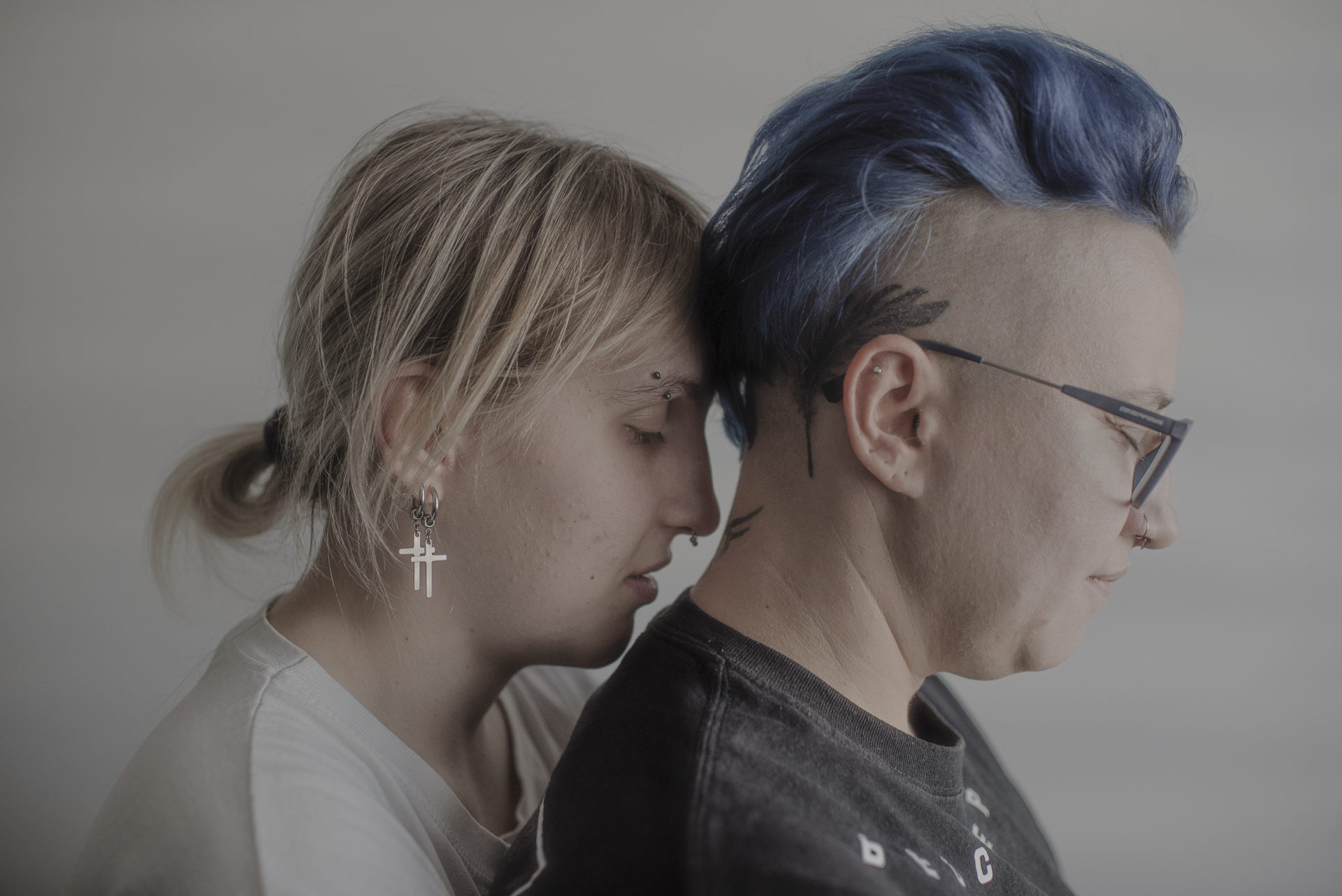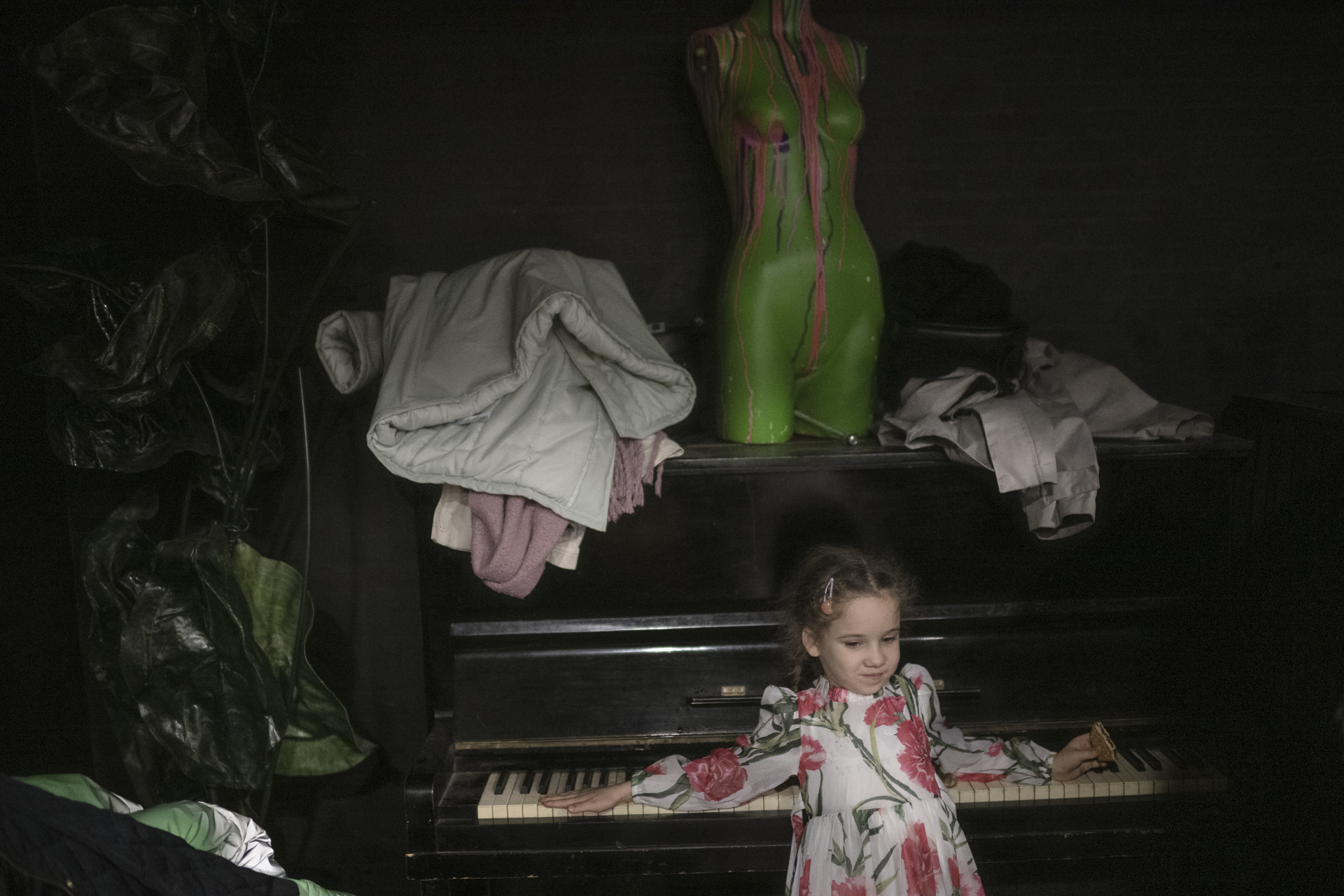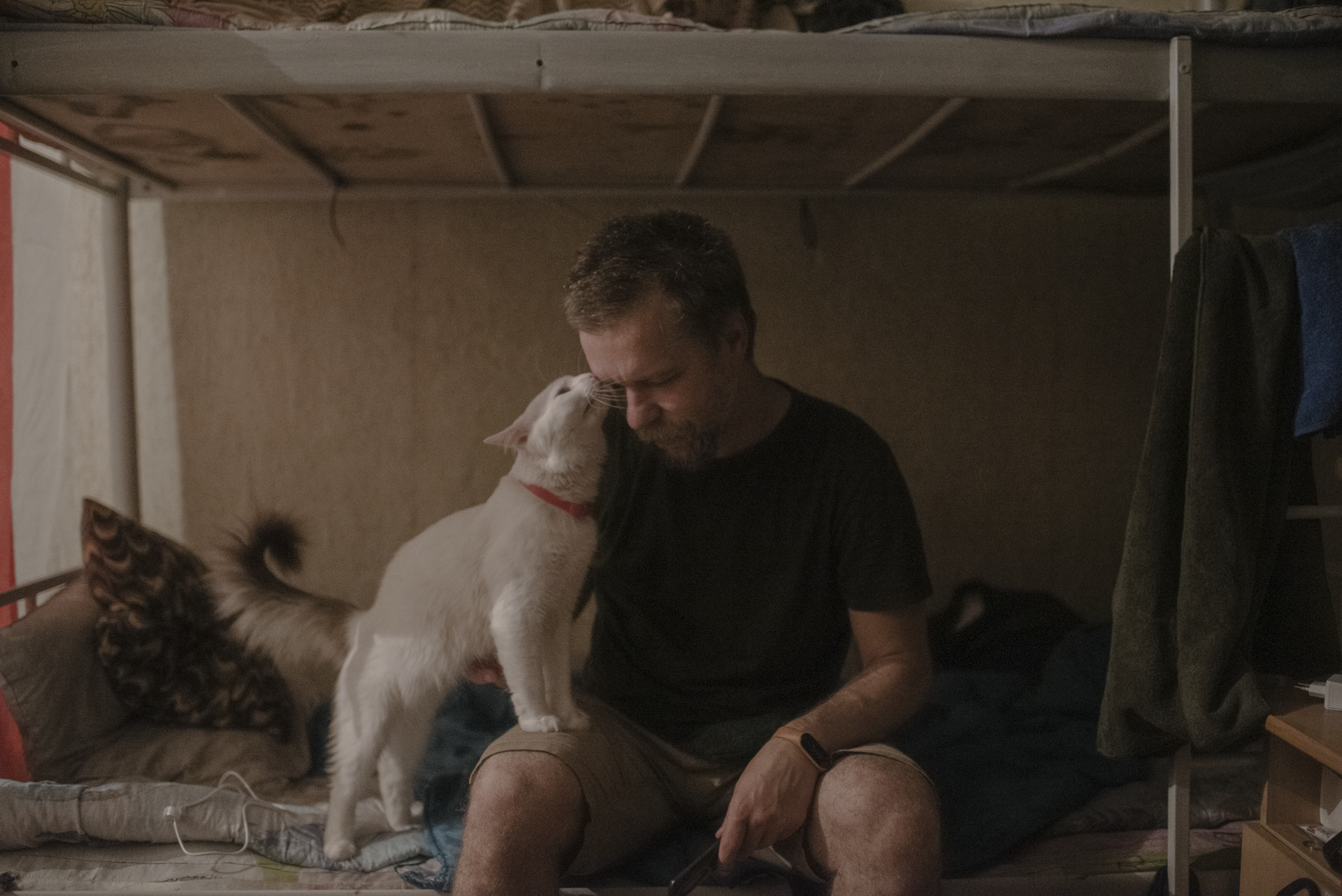Map of Memories
The world watches the war in Ukraine and Russian politics, but barely notices a country trapped in an authoritarian deadlock – under constant pressure from Moscow on one side and 30 years of rule by Lukashenko on the other.
The fallout from the 2020 fraudulent elections and crushed democratic movement in Belarus still unfolds – repression continues, exiles grow, and former political prisoners face new uncertainty. My project documents this ongoing aftermath, tracing displacement, resistance, and a nation in limbo. I am not just documenting this story; I am living it.
Through portraits and daily life, my work explores exile, identity, and the struggle to hold onto home. It is not just documentation; it is an attempt to answer the question of what it means to be Belarusian when the homeland has become more of a memory than a place. The Belarusian experience shows and warns that repression, emigration, and the disappearance of civil society are not just a national tragedy but part of the global struggle for democracy in a world where authoritarianism is rising again.
Twice forced Belarusian migrant Vesta in a temporary shelter in Warsaw, Poland, on March 3, 2022. On the night of August 28-29, 2020, due to possible political persecution, Vesta and her husband Stas fled from Belarus to Kiev, Ukraine, which became their home. At the end of 2021 and beginning of 2022, they were considering the option of buying a house near Odessa and were preparing documents. On February 26, 2022, after Russia started a full-scale invasion, they went to Lviv but faced the problem of being unable to rent an apartment due to the fact that they are Belarusians. They spent a night in Lviv in the gym, where temporary housing was organized for those in need. When they crossed the border between Ukraine and Poland, Ukrainian border guards asked, “Where will you run away, Belarusians?”
The situation at the Bobrowniki border crossing (Poland - Belarus) during its closure for an unknown period. Bobrowniki, Poland. February 10, 2023. The Bobrowniki border crossing was closed by Poland in February 2023, following the trial and sentencing of Andrzej Poczobut, a Polish-Belarusian journalist and activist, to eight years in prison on politically motivated charges in Belarus. This decision further strained relations between the two countries. As of February 2023, the Brest-Terespol crossing remained the only operational border point for passenger traffic. The Kuźnica-Bruzgi crossing had already been closed in 2021 due to the Belarusian government orchestrating a migrant crisis, with thousands of asylum seekers attempting to storm the Polish border. The closure of Bobrovniki compounded difficulties for Belarusians fleeing political repression and for those traveling for work or supplies. It also affected Polish businesses dependent on cross-border trade, increasing isolation and exacerbating hardships on both sides of the border.
Belarusians gathered in Warsaw, Poland, on 25 March 2022, for a massive rally dedicated to “Freedom Day” and a meeting with president-elect Sviatlana Tsikhanouskaya. Freedom Day is an unofficial holiday in Belarus, celebrated on 25 March to commemorate the declaration of independence by the Belarusian Democratic Republic through the Third Constituent Charter in 1918. In Belarus, Freedom Day 2021 marked the last day of protest marches against the allegedly fraudulent 2020 Belarusian presidential election, with over 200 people arrested.
Gleb (18), call sign 'Sych' receives support from his girlfriend in Grojec, Poland, on November 24, 2022. Having joined the war as a volunteer fighter with the Kalinouski regiment in March 2022, Gleb left the front line in July 2022 due to shrapnel wounds and the psychological scars of war, including PTSD. Now, in recovery, Gleb faces an uncertain future, navigating the haunting memories of the battlefield and the struggle to rebuild his life. Gleb, like many Belarusian volunteer fighters, cannot return to Belarus, where they would face persecution and likely imprisonment for their involvement in the war. Instead, they seek refuge in countries like Poland, Lithuania, and Georgia, attempting to build new lives. However, the process is fraught with difficulty, as many feel abandoned by their home country and face challenges finding stability in their new environments. The situation is dire, with some former fighters struggling to adjust to civilian life and suffering from mental health issues. Tragically, several have taken their own lives or died in suspicious circumstances after returning from Ukraine, including cases in Lithuania. In December 2024, a Belarusian volunteer fighter was deported from Vietnam back to Belarus, highlighting the ongoing risks for those who fought for Ukraine's defense and are now targeted by Belarusian authorities.
Hands of a Belarusian volunteer fighter, Gleb (18 years old), call sign “Sych,” who went to war in Ukraine in early March 2022. 24 November 2022, Grojec, Poland. Gleb left the front line and the Kalinouski regiment in July 2022 with shrapnel wounds in his legs, persistent nightmares, and post-traumatic stress disorder. Now, he is recovering and trying to rebuild his life. This period is marked by profound uncertainty and a struggle to find his place in the world—unsure whether to return to the war in Ukraine or pursue a different path.
Belarusian national leader (president-elect) Sviatlana Tsikhanouskaya during the interview for France24 at the studio in Paris, France on October 6, 2022. On February 24, 2022, Svetlana Tikhanovskaya declared herself the representative of the Belarusian people and the guarantor of their rights and freedoms until new elections. Later, the Joint Transitional Cabinet (proto-government) was created. In 2.5 years, she made about 90 official visits and achieved significant international recognition and support by applying external pressure and seeking new sanctions on the Lukashenka regime and isolating him. However, during this time, due to the lack of a clear plan of action, some disagreements among the democratic forces, she has lost some influence on people inside the country, where Lukashenka continues to hold power through incessant repression, allowing for even greater integration with Russia and the provision of the country's territory for an attack on Ukraine. Paris, France. 6 october 2022.
Self-portrait in a rented room during one of my work trips to the border with Belarus. Hajnówka, Poland. December 23, 2024.
Artsyom, a Belarusian migrant, celebrates his 29th birthday at the "KARMA" bar in Warsaw, Poland, on 3 July 2022. Artsyom reflects on his journey as a "professional migrant," noting the constant displacement he has experienced. "I first fled to Ukraine two days after my home was searched, knowing it was unsafe. Once I settled there, the war began, forcing me to leave again, this time to Poland. A month later, I moved to Georgia for three months, awaiting a visa, before returning to Poland. On my birthday, surrounded by friends I hadn't seen in years, one of my closest friends, who I hadn’t seen much either, held me in their arms. Migration is not just about moving; it’s about the struggles of adapting to a new life. From learning a new language to navigating legalities and housing, it's a constant challenge. 'Normal' life seems like a distant concept, and sometimes you forget what that even means." The "KARMA" bar, originally from Minsk, closed in Belarus in 2021 due to political pressure. It opened in Kyiv but was forced to relocate again after the war started, eventually finding its new home in Warsaw and Gdansk.
Zoya Belakhvostsik, an actress from the Kupala Theater, during the premiere of the performance "GESE-HUMANS-SWANS" based on Alherd Bakharevich's book "Dogs of Europe" in Lublin, Poland, on 17 June 2022. In this performance, she portrays a typical representative of the authorities in Belarus, highlighting the tensions surrounding the political climate. In August 2020, nearly 60 members of the Kupala Theater, including artistic director Nikolai Pinigin, resigned in protest against the dismissal of director Pavel Latushko. Since then, only 15 members of the original cast have remained. The theater has periodically held castings to replace members, mostly recruiting new actors from the Institute of Culture. Today, the Kupala Theater presents only five performances on its main stage. Since the summer of 2020, over 800 figures from the Belarusian cultural scene have faced repression, with at least 98 individuals currently imprisoned, according to the Belarusian Rada of Culture.
Anti-war action of Belarusian women in Warsaw, Poland against the war in Ukraine on March 6, 2022. Just like it was on August 12, 2020 in Belarus, at the protests against violence, the girls came out in white clothes and with flowers.
Nasta Bazar (right) and her wife Dasha (left) in Krakow on October 26, 2022. Feminist and grassroots activist Nasta left Belarus for Kyiv in 2020 with her family. Shortly before the start of the war she moved to Poland. Nasta's main area of activism is protecting the rights of women and members of the LGBTQ+ community. Nasta volunteered from the very beginning of the war in Ukraine and has tried to focus on helping women who have suffered from sexualised violence.
Advisors to the elected President of Belarus in exile, Sviatlana Tsikhanouskaya, during her official visit to Norway, where she participated in the Nobel Peace Prize ceremony honoring Belarusian human rights activist Ales Bialiatski, who is currently imprisoned in Belarus. December 9, 2022, Oslo, Norway. The Nobel Peace Prize was awarded jointly to Ales Bialiatski, the Russian organization Memorial, and the Ukrainian Center for Civil Liberties for their outstanding contributions to human rights and democracy. Ales Bialiatski, founder of the human rights organization Viasna, returned to Belarus in 2021 despite the high risk of detention, demonstrating his unwavering commitment to the fight for democracy and human rights. Viasna has been a critical voice in documenting political repressions, supporting political prisoners, and advocating for civil liberties in Belarus. After his arrest, many other Viasna members were also detained, reflecting the broader crackdown on civil society organizations. Despite these challenges, Viasna and numerous other NGOs continue their work in exile, operating from outside Belarus to shed light on human rights abuses and provide support to victims
Portrait of Natalya Suslova at the base of the Kalinouski Regiment in Kyiv, Ukraine, on 4 August 2022. After the death of her son Pavel “Volat” in May 2022, Natalya came to Ukraine from Belarus and joined the Kalinouski Regiment. Pavel had been the commander of a scout unit in the regiment. Natalya became part of the “Terror” battalion within the Armed Forces of Ukraine and took part in the liberation of Kherson, being among the first to enter the city. In Belarus, she actively participated in the 2020 peaceful protests against Lukashenko’s regime, during which she was detained and held in custody for several days.
Ayaa, a young girl, at a costume fitting for artists at the Belarusian festival "Varshunyak." Ayaa is the daughter of the well-known Belarusian singer Rusya (Shuma). Warsaw, Poland. December 21, 2024.
A fighter of the Kalinouski Regiment, nicknamed "Chili," and his cat at the regiment's base in Kyiv, Ukraine, on 2 August 2022. "Chili" is a Belarusian who has been living in Ukraine for 15 years. When the war began, he and his wife were in Lviv. They decided to relocate to Kyiv and turned their apartment in Lviv into a temporary shelter for refugees, providing a safe haven for those fleeing the conflict. The Kalinouski Regiment is one of the most prominent Belarusian volunteer formations fighting in Ukraine. Established in March 2022, it was named after Konstanty Kalinouski, a 19th-century Belarusian national hero who led an uprising against the Russian Empire. The regiment consists of Belarusians opposing the Lukashenko regime and Russian aggression, with many seeing the fight in Ukraine as directly tied to the struggle for Belarus’s freedom. Thousands of Belarusians have joined Ukraine’s Armed Forces, despite the risks of persecution or imprisonment if they return to Belarus.
A motorhome named Marusya at the Przekupalle music festival, located 15 km from the Belarusian border in the village of Biendziugi, Poland. August 17, 2024. Owned by a Belarusian family, Marusya has become a recognizable gathering space for Belarusians at festivals and outdoor events. Over the years, it has hosted notable guests, including musicians from RSP and opposition figures like Sviatlana Tsikhanouskaya. After fleeing Belarus in late 2020 due to multiple administrative and potential criminal charges, the family rebuilt the 1984 motorhome as a symbol of freedom and stability amidst displacement. As the owner shares, “Paradoxically, this house on wheels is my most stable home for the rest of my years - rents and cities change, but Marusya doesn't. Only there do I feel at home"”
Pasha Kritchko
Pasha Kritchko (born in 1987) is a former civil engineer and wedding photographer from Belarus who turned to photojournalism during the 2020 presidential election and mass protests, using his camera to document state violence and human rights abuses following the rigged vote.
His current work focuses on the ongoing Belarusian crisis that began in 2020, including the stories of Belarusian volunteer fighters in Ukraine and the struggles of refugees forced to flee the country. Through his photography, Pasha aims to shed light on these issues and highlight the challenges Belarusians face both at home and in exile.

















